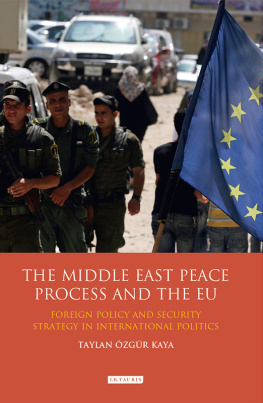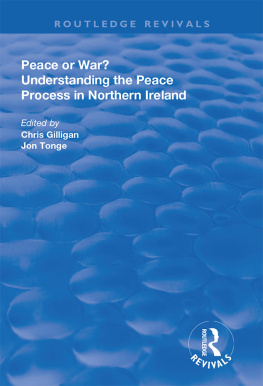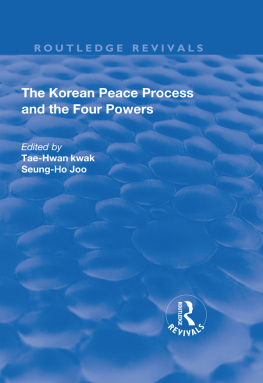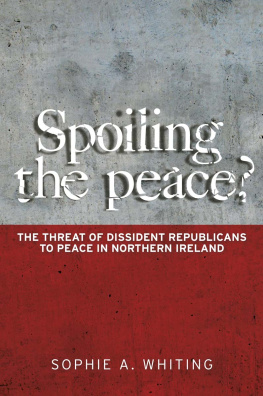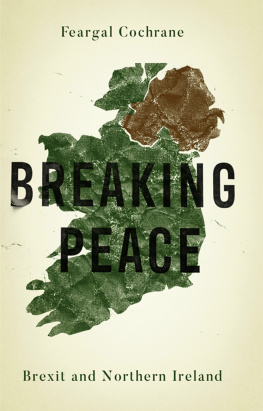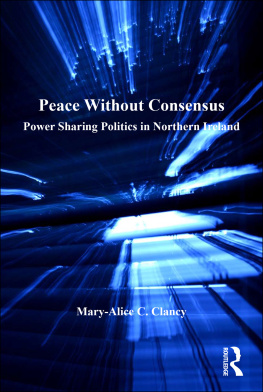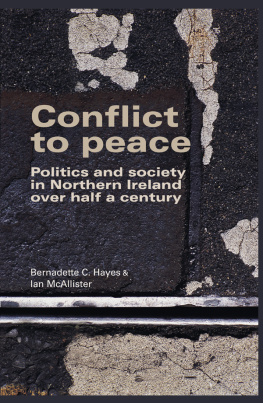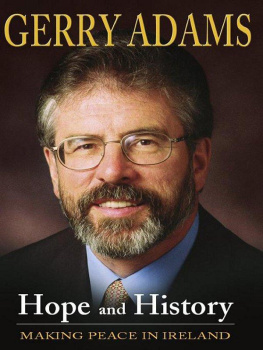The Problem and the Purpose of the Research
This study is concerned with how the national television news media has covered the Northern Ireland peace process and its role within the politics of that process. It examines how news constructed the peace process during the formative years of peace negotiations (1994-98) and how politicians tried to use news as a mechanism for contesting and promoting the shape of peace.
The peace process, which took the form of an expansive political process more specifically from 1993, signalled a marked change in the political complexion of Northern Ireland by offering the possibility of moving from a situation of conflict to one of conflict resolution. It represented, to put it another way, a fundamental shift away from the politics of terrorism which had dominated the conflict in Northern Ireland since 1969, towards a politics of peace.
Central to explaining and describing this transition has been the news media, who now refer to developments and events by way of their impact on the peace process as a matter of convention. The peace process, it would appear, now provides us with a framework for understanding the political developments of Northern Ireland and to the extent where it is less Northern Ireland which is now in crisis, or on the verge of a breakthrough, but the peace process itself.
Television news coverage of the emerging peace process signalled a fundamental break with some of the conventions of reporting which previously dominated much of the conflict. Once established as a credible political process, news was no longer able to rely on images of terrorist violence to represent the conflict as being inherently about warring factions or sectarian hatreds as before. Instead, the peace process replaced the politics of terrorism with negotiations about peace, and for news this meant applying a different set of references and codes by which to make sense of what was going on in Northern Ireland.
This book sets out to examine the function of news within the political transition which became commonly referred to as the peace process. In particular, it is concerned with how news and politics interacted and how this interaction affected the promotion and development of peace. It is concerned with how politics was contested through news and how patterns of reporting about peace (referred to as the peace process paradigm in this study) impacted on that contestation.
This research addresses a number of questions surrounding the problem of the role of news within peace negotiations. To start with, although there has been much written on the role of the news media within the conflict in Northern Ireland from 1969 until the peace process in 1993 (Curtis 1986; Schlesinger 1987; Miller 1994; Butler 1995), there is far less material available about the role of the news media within the resolution of that conflict from 1993 onwards (Tangen Page and Schwarz 1994; Miller and McLaughlin 1996). There is plenty of material available about the medias tendency to adopt dominant explanations of the conflict and to play a supportive role in relation to state propaganda in the war against terrorism (Curtis 1986; Schlesinger 1987; Miller 1994), but less is known about whether the media played a similarly supportive role in relation to dominant explanations about the emerging peace. One of the key concerns of this book is to address this deficiency and to examine whether the news media acted in a similarly supportive way towards dominant articulations of the peace process as they did before, during the war against terrorism. To put it another way, I aim to examine how the peace process emerged as a news paradigm (pattern of reporting) and how that paradigm affected the representation of elite positions and political discourse.
In conducting this study, I obtained interview data from those involved in the politics of peace and those involved in the selection and presentation of news reports about that peace. Indeed, the central importance of this study resides in the interview material, which has been gathered through a series of in-depth interviews with politicians, journalists and editors involved in the politics and the reporting of the peace process from 1994-98 (see Appendix 1 for research methodology and interview techniques). Through this material I have been able to establish a picture of how politicians perceived the role of news in relation to their objectives, as well as how those working in news production came to understand those objectives in news terms. This has helped to create a comprehensive picture about how news functioned in relation to political objectives and introduces relevant new material with which to consider the role of news in relation to dominant political intentions.
If politicians are not assisted by news in the promotion of their respective positions in relation to peace, then this raises questions about the importance of news for political control and suggests a need to re-examine theories which emphasise the role of news for the legitimisation of political direction and policy. This study is not therefore only about news and the peace process (although its primary intention is to examine that relationship), but has implications which impact on theories which assert the necessity of news for the legitimisation of political power. If politicians experience problems in their efforts to develop peace which are exacerbated or even caused by news coverage, then there is clearly a need to question perspectives which stress the centrality of supportive news coverage for the effective conduct and exercise of political objectives. Because of this and in the light of the empirical material which is foregrounded in this study, it becomes pertinent to examine key theoretical debates which prioritise the reproductive tendencies of news in relation to political elites and conflict and which view news in terms of being an essential arena for the communication and contestation of political aims.





